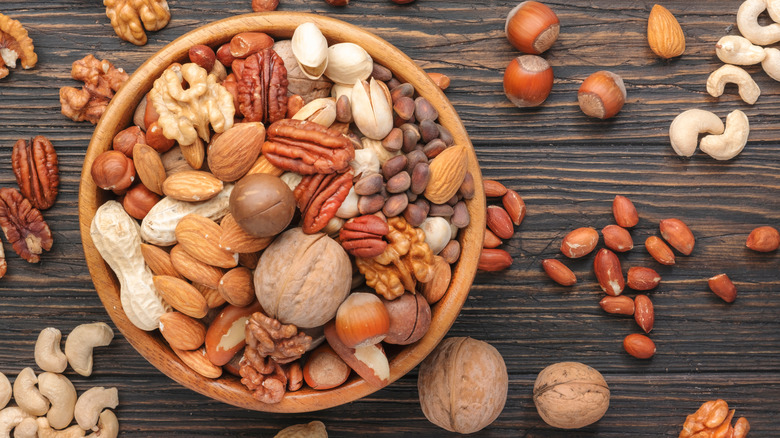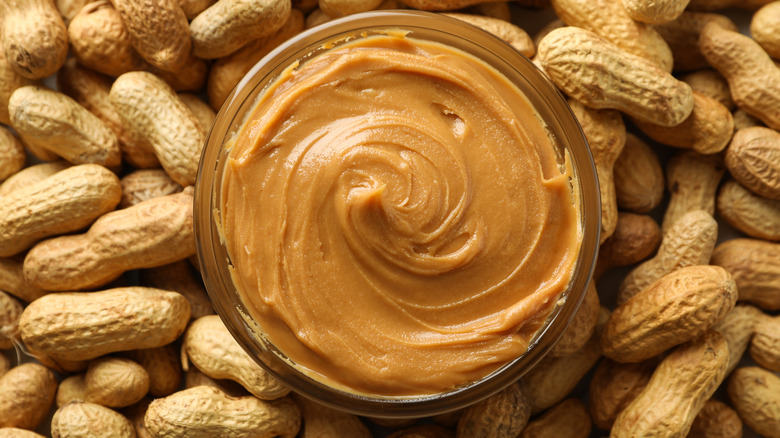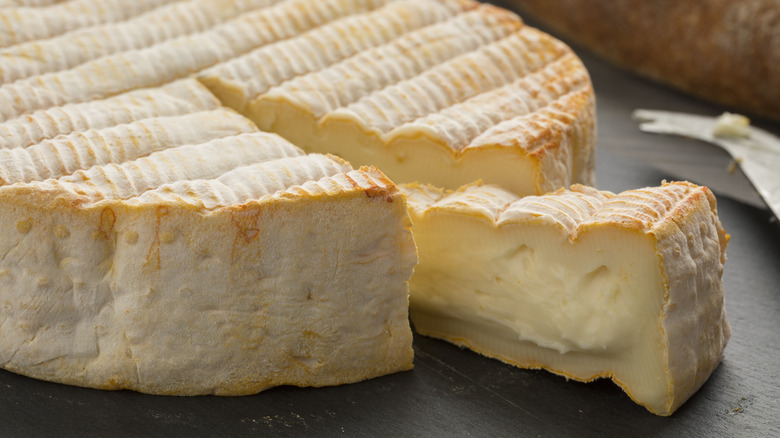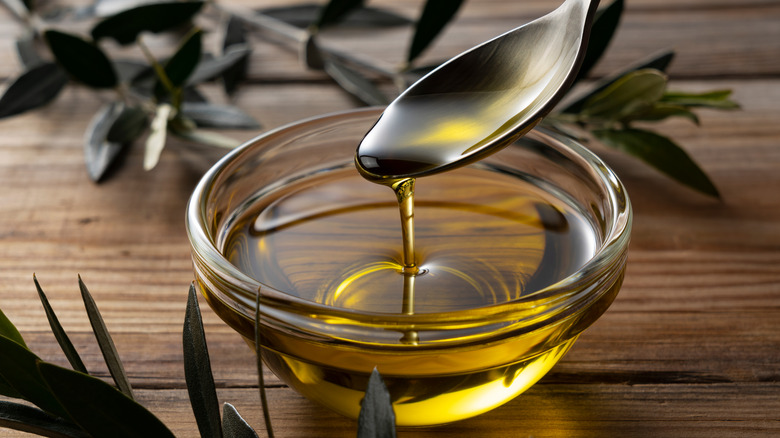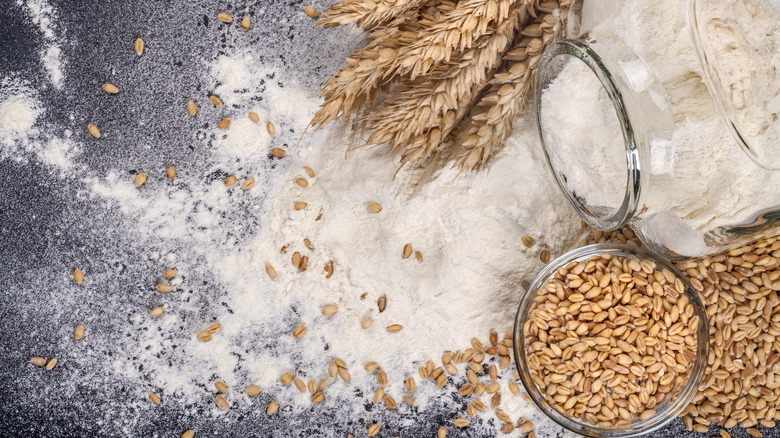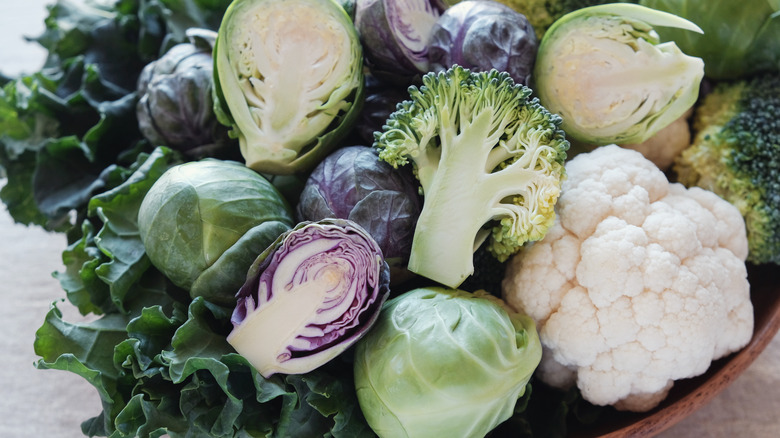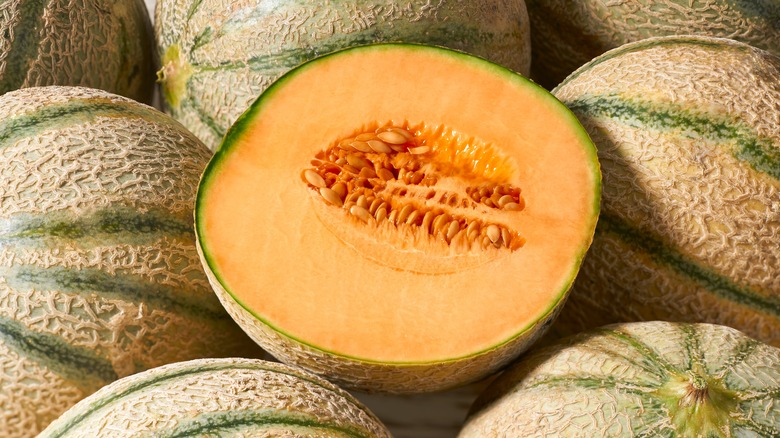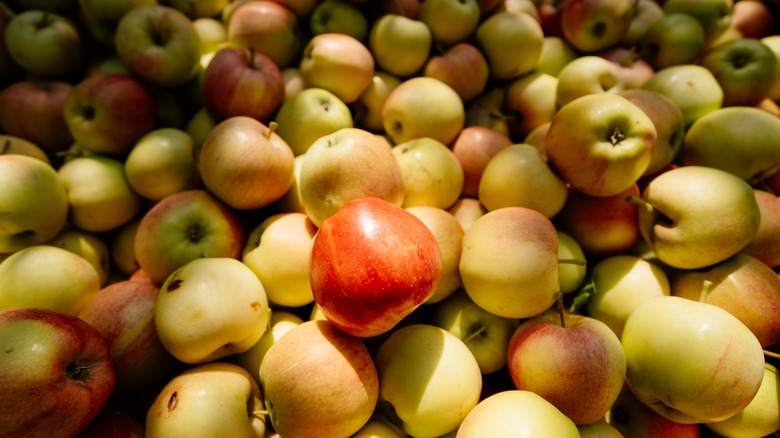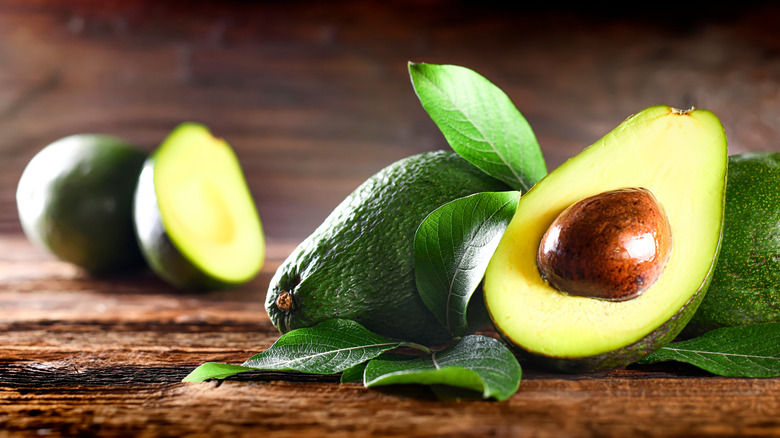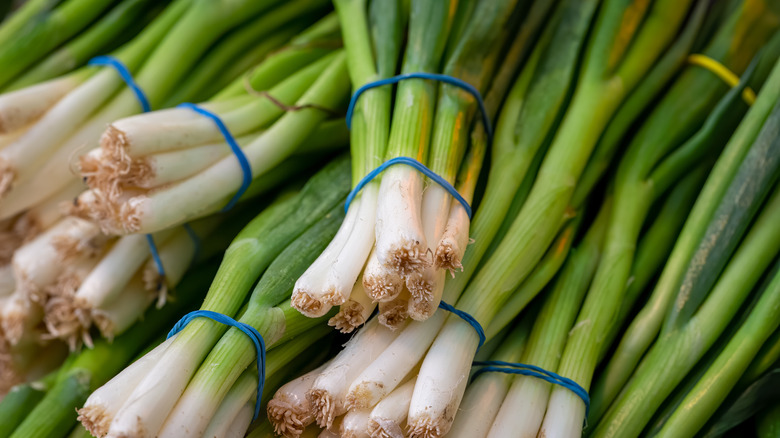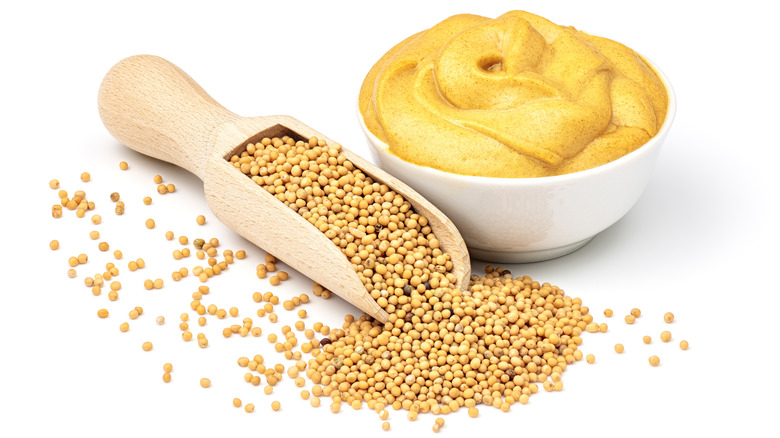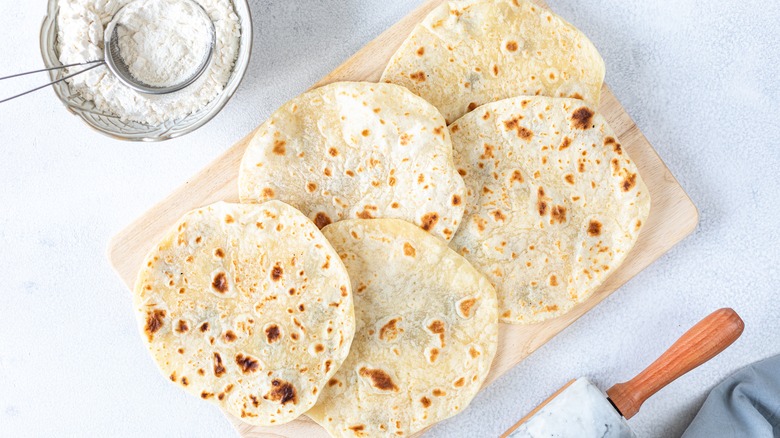24 Unexpected Foods You Should Refrigerate
The invention of the modern refrigerator changed people's way of life in the 1920s, notes Whirlpool, as refrigeration allowed Americans to safely and effectively store perishables for extended periods.
But what foods are perishable? There are many confusing theories on foods you should never refrigerate that surprisingly never expire and those best kept safe and sound sealed in your icebox. We know items like chicken, mayonnaise, eggs, and milk store best in the icebox under 40 F, the perfect temperature to set your refrigerator. (And yes, the USDA recommends eggs really do need to be refrigerated).
However, some pantry staples benefit from the chilled environment of your fridge. And is it best to keep those items in your fridge from the moment you bring them home from the store, or is pantry storage fine until the item has been opened or ripened? Let's answer these questions by noting surprising foods you likely never thought needed to be kept on the cool shelves of your Frigidaire.
Butter
You have just spent days researching the most beautiful butter board to create for your next cocktail party. However, the butter and toppings will sit at room temperature throughout the night, making you wonder if it is safe to consume room-temperature butter. Do you really have to refrigerate butter?
According to LiveScience, butter made from milk contains around 17% water, meaning leaving it unrefrigerated will cause bacteria to grow and turn the spread rancid. Refrigerating butter will extend the shelf life past the "best use-by" date on the package by a few weeks. Leaving it on the counter could turn butter rancid with a bitter, disagreeable flavor and aroma within a week.
Nuts and seeds
Healthline reports an ounce of almonds contains 6 grams of protein, over 3 grams of fiber, and 9 grams of heart-healthy monounsaturated fats. Almonds are the perfect low-carb grab-and-go snack. However, if you're grabbing them from the pantry for a mid-day munch, you've been storing nuts the wrong way.
Nuts contain high amounts of natural oil, which will become rancid if exposed to heat, air, and light. When the nuts spoil, the flavors will become bitter, the flesh will become dark and oily, and the taste will be off-putting. To prevent spoilage, we recommend cold storage. Shelled nuts will last in an airtight container in the refrigerator for six months without issue and up to two years in the freezer. The same is valid for seeds, like poppy or sesame, with their best storage being in the refrigerator.
Peanut butter
The American Peanut Council reports that 60% of the peanuts grown in America produce peanut butter. It is a classic all-American snack. Like shelled nuts, all kinds of nut butter, including peanut, almond, cashew, and tahini, can turn rancid once opened.
The shelf life of peanut butter is extensive due to its high oil and low moisture content. However, over time, the jar of open nut butter on the shelf of your pantry will become rancid. Exposure to oxygen, where the air breaks down the fatty acids in the butter, will be the death of your jar of peanut butter. It can spoil even faster if the product is entirely natural.
Oxidation makes the odor and flavors bitter, pungent, and off-putting. Chilling the product can deter oxidation. Refrigeration will slow the growth of unwanted bacteria and oxidation. Refrigerate the jar once you've opened it, and that will add three to six months of enjoyment for your creamy or chunky nutty spread.
Cured meats
Though cured meats, like prosciutto and salami, are often sold with the non-perishables in your local grocery stores, you should never store cured meats in your pantry. Once you slice cured meats, they will lose their moisture, removing their flavor. Once sliced, the meats will have a refrigerator shelf life of a few days to a few weeks, depending on the cut.
We recommend placing the meat in a well-sealed plastic bag or container in a fridge with a temperature below 45 F, locking in the flavor. The ideal storage environment is a cold, dark place in your refrigerator, likely on the bottom shelf.
Smoked salmon
Sunday brunch would only be complete with bagels, lox, and smoked salmon, but what is the best way to store the smoky cured fish?
All smoked salmon should be refrigerated. Some brands may note that it is shelf-stable outside of refrigeration. Still, all fish is perishable and prone to developing bacteria. It is best to be safe, storing smoked salmon in the coldest part of your refrigerator in a well-sealed package.
Once open, it is safest to consume the salmon within a few days. If you need room in your fridge, you can store the fish in the freezer for up to three months without ruining its quality.
Cheese
Perishables, including milk, should be housed below 40 F in the refrigerator. Though cheese is a part of the dairy family produced from milk, not all cheese requires refrigeration for safety. Surprisingly, according to the USDA, hard cheese, like parmesan and aged cheddar, does not require refrigeration. However, many do.
All soft, creamy cheese, like goat cheese, brie, and cream cheese, should always be stored in a cold refrigerated environment. Cream cheese will stay fresh for roughly two weeks in the chilled vessel. In contrast, other soft cheese, like ricotta or cottage cheese, should be consumed within one week.
Maple syrup
Authentic maple syrup layers sweet vanilla, caramel, and slightly earthy, floral flavors. While imitation options claim to have genuine maple flavor, only the real deal reveals the complexity of natural maple syrup. And that complexity needs to be protected.
Heifer International details the process of producing maple syrup, reporting that syrup comes from sap collected from sugar maple trees on cold winter mornings. The fluid contains a tiny amount of sugar and 98% water. The sap boils, removing the water and leaving only the sweet, sticky, liquid gold behind.
The authentic syrup needs cold temperatures once opened to preserve its freshness. If you don't refrigerate maple syrup, it can spoil, developing mold and bacteria. We suggest refrigerating right when you bring the syrup home from the store, even before it is opened, and especially afterward. Refrigeration will prevent oxidation and deterioration of the product, keeping it fresh for up to a year.
Plant-based oil
Plant-based oils, like olive oil, grapeseed oil, and canola oil, are rich in heart-healthy polyunsaturated and monounsaturated fat and are high in essential omega-3 fatty acids, much like fish oil. Fish oil supplements will spoil rapidly if not held in cold storage. Like fish oil, plant-based oil will turn rancid if not properly stored.
To properly keep high-quality plant-based oil, treat it like a bottle of wine in the kitchen. Never place wine or oil near excessive heat or in brightly lit rooms. In other words, if it is sitting by the stove or in direct sunlight, you've been storing olive oil wrong.
While these oils don't necessarily need to be chilled, refrigeration will prolong their life. Storing olive oil in the fridge can reduce the risk of oxidation and spoilage, extending the shelf life by several months. Storing sesame oil in the refrigerator will extend the life of an open bottle by six months.
Vinegar
Ina Garten never stores vinegar in the pantry. As the Barefoot Contessa is the kitchen queen, we have to agree. The real reason Ina Garten stores vinegar in the refrigerator is to prevent bacteria from developing.
The likelihood of this happening is low. As Dictionary.com defines, vinegar is a sour liquid consisting of acetic acid obtained by acetous fermentation from wine, cider, beer, ale, etc. The acetic acid in vinegar acts as a preservative. However, Garten believes it is better to be safe than sorry, storing her vinegar in her refrigerator door.
The theory may hold up. Some kinds of vinegar with less acidity, like rice wine and malt, may fare best in the refrigerator, as can mid-range vinegar, like balsamic. As high-quality balsamic vinegar can be expensive, it is best to follow Contessa's advice.
Whole wheat flour
Whole grains like whole wheat flour are nutrient-dense foods. Healthline reports one 3-ounce serving has over 10 grams of fiber, 13 grams of protein, and vitamins and minerals like magnesium, selenium, copper, and folate. The health site shares that including antioxidant-rich whole wheat flour in your diet helps prevent cancer and improve gut health.
Keeping all those nutrients fresh for baking whole wheat pumpkin banana bread is key to preserving the flour's quality and flavor, but should you refrigerate flour? You should. As whole wheat berries are milled and ground, the seed's germ comes in contact with oxygen, which can spoil the flour over time.
Store whole grain flour in an airtight, sealed container in the back of your refrigerator or freezer to maintain freshness. This type of storage will ensure it remains free from mold and slow the probability of oxidation and spoilage.
Cruciferous vegetables
How to properly store vegetables can be confusing. Some are best on the kitchen counter, like tomatoes. In contrast, some survive best in a paper bag in the pantry, like potatoes. And still, some are best in the fridge, like cruciferous veggies. Without question, the absolute best ways to store cauliflower and the best ways to keep broccoli fresh are in the refrigerator.
Cruciferous vegetables, like cauliflower and broccoli, should be placed in an unsealed bag allowing ventilation in the crisper drawer of your refrigerator. The veggies will remain fresh for about a week or two. And always store these vegetables in a different crisper bin with orchard fruit, like apples or pears, as the fruit's ethane gas will ruin the vegetables.
Ripe bananas
It may seem silly to place golden-yellow, ripe bananas in the chilled environment of your ice box. We know that if you refrigerate bananas, the skin will turn brown, which looks rather unappealing to eat on the outside. However, refrigeration halts the ripening on the inside, keeping the fruity flesh firm and fresh, and the sweet tropical flavor is intact.
If you refrigerate a banana after it has started spotting and turning brown on your counter, the fruit inside will quickly turn mushy and spoil. It is best to place the fruit directly in your fridge when you bring it home from the market, extending the shelf life by two weeks.
Citrus
Citrus fruit adds a bit of sunshine to the environment. A bright yellow bowl of lemons or a deep green bowl of limes brightens up any kitchen they call home. However, the absolute best way to keep lemons fresh is not by keeping them on the counter. It is by storing them in the refrigerator.
Cook's Illustrated performed several tests to see how to best store the fruit, including several refrigeration and countertop options. Within a few days, tests showed the unrefrigerated citrus became hard. In contrast, citrus sealed in airtight bags in cold storage remained soft and fresh for up to a month.
Cantaloupe
According to The University of California, cantaloupe melon is a member of the gourd family, the same as honeydew and watermelon. Some melons store best without refrigeration, like watermelon. However, ripe cantaloupe melons should be kept in cold storage.
The university shares it is best to place the whole cantaloupe in the crisper drawer of your fridge, held at a temperature between 36 F and 41 F. Keeping the melon in the crisper will keep it fresh for almost a week. If you purchase cut melon, buy it from the chilled refrigerator case at your grocery store. This location will ensure its freshness, preventing the fruit's probability of developing salmonella.
Apples
In the historical novel, "Canterbury Tales," Geoffrey Chaucer notes an insolent chef's behavior seeping into the kitchen to ruin the whole, or one bad apple ruining the bunch. The age-old proverb has factual merit in the fruit's preservation.
One rotten apple can ruin an entire bushel of fruit. Apples ripen from the inside out, with their thin skin emitting ethane gas from within to accelerate the fruit's maturation. Even once the fruit is crisp and tender, the ripening emissions continue, filtrating into other fruits and vegetables with which you may store the apples.
The absolute best way to refrigerate apples is to keep them alone in the crisper at 31 F to 36 F on a moistened towel, keeping the fruit moist and crisp. Refrigeration helps slow the gas's release into the atmosphere, prolonging the shelf life of the fruit.
Ripe avocado
Though you may purchase avocados outside of the cold section in your grocery store, it's okay to store avocados in the refrigerator if the fruit is ripe. Cold storage is one of the best ways to keep avocados fresh, prolonging the life of ripe avocados for two to three days. ensuring the creamy, dreamy fruit is ready to top your morning toast.
And keep it tightly wrapped in the fridge if you have cut an avocado, using only half to create your morning sourdough avocado toast or transforming the buttery flesh into crave-worthy guacamole to prevent oxidation. Exposure to air will oxidize the fruit, turning the dip brown.
Green onions
Green onions, or scallions, are a part of the allium family, like garlic, bulb onions, and leeks. However, when considering scallions, the best way to keep onions fresh is in the refrigerator and not in the cool, dark pantry with the shallots, garlic, and bulb onions.
We suggest keeping green onions in a jar and suspending the roots in water in the refrigerator to keep them snappy and crisp. You can also wrap scallions in a damp paper towel and place them in the crisper drawer to keep the onions fresh for up to a month. Just make sure to periodically change the towel.
Red spices
The thought of storing spices in the refrigerator may sound odd. Kitchen stores have made millions off of the sale of those swirling spice racks often placed right by the stove on kitchen counters. But, some spices can benefit from cold storage.
Healthline reports that red spices, like ground paprika, cayenne pepper, and chili powder, will retain their vibrant scarlet color longer if stored on a shelf in the refrigerator. This type of storage will also help prevent mold development from exposure to moisture.
Refrigerators are dry environments generally free from humidity but don't place the spices in the crisper drawer. The humidity of the crisper can vary, allowing for mold-producing moisture to affect the spices.
Mustard
Mustard is one of the universal condiments in your pantry. It can emulsify a salad dressing, add zest to roasted chicken, and cut through the richness of a fried corn dog. It also holds an impressive shelf life. Unopened mustard can last for up to three years on a cool, dark pantry shelf. However, before storing mustard in the pantry, consider the condiment's punchy, acidic flavor.
McCormick, the producer of French's Mustard, offers that though it is not necessary to refrigerate mustard, leaving it opened in the pantry may cause it to lose that zesty tang we love about the product. Cold storage of open mustard will ensure the quality remains intact, extending its life up to a year.
Tortillas
It's a bad idea to refrigerate bread. However, the classic Mexican combination of flour and water known as tortillas will benefit from the frosty chill of cold storage. Though tortillas can be stored in a temperature-stable environment on a pantry shelf for up to two weeks, you really need to refrigerate tortillas.
Store fresh tortillas in the refrigerator when you bring them home to extend their shelf life. Refrigerating corn or flour tortillas versus pantry storage can extend the shelf life for a month beyond the sell-by date. When ready to enjoy, we do recommend bringing the tortilla up to room temperature before digging in for taco Tuesday.
Wine
If you live by the motto that corks are for quitters, never leaving a bottle of opened wine unfinished, this one isn't for you. However, if you indulge in only one glass of red wine in the evening, do yourself a favor and don't leave that open bottle on your kitchen counter.
Wine Enthusiast recommends replacing the bottle with the stained side of the cork, or using a wine stopper with a solid seal, to prevent oxygen from seeping into the bottle. Then, place the bottle upright inside your refrigerator. While putting the bottle in the coldest area in the back of your fridge is unnecessary, keeping wine in the door will extend its life. Refrigeration will slow the deteriorating oxidation process within the wine, giving you an additional three to five days of enjoyment.
Irish cream
Enjoying a shot of Bailey's on the rocks or a cup of coffee is a sweet treat to end an evening. Before you stir the creamy, silky liqueur into your decaf, consider how long it has been sitting on your shelf. The shelf life of Irish cream liqueur is short, whether you are storing it in the liquor cabinet or refrigerator.
Unlike other liquors and liqueurs, Irish cream, like Bailey's and Amarula, contain dairy, which can spoil if not refrigerated. Unopened Irish cream has a pantry shelf life of only three months versus six months in the fridge.
Coffee
While it's a bad idea to refrigerate coffee beans, the leftover brewed coffee from your morning pot can maintain an enjoyable flavor if stored properly. The second you grind coffee beans, they begin to oxidize, changing the coffee's taste, rapidly increasing when brewing the coffee. Though the reaction is initially pleasing, producing the roasted aromas and flavors we love in a fresh cup, those flavors can begin to degrade within 30 minutes.
Store brewed coffee to enjoy later in a well-sealed container to prevent oxygen from entering the vessel and place it in your refrigerator. Following these steps will extend your coffee's life by about a day, but sadly, not much longer than that.
Kombucha
The only reason you shouldn't be refrigerating kombucha is if you want to create a home-brewed cocktail. Kombucha production occurs by fermenting yeast and healthy bacteria to develop a probiotic-filled beverage. This fermentation continues even after the bottles have been shipped and sold in stores.
If left unrefrigerated, the drink will continue to ferment, with the yeast eating the sugars, increasing the alcohol inside the bottle while producing additional carbonation. Leaving kombucha at room temperature will also increase its acidity, changing the flavor. If left for long periods without cold storage, the chemical reaction of growing carbon dioxide inside the bottle will eventually cause it to break. Do yourself a favor, and keep your bucha nicely chilled.


